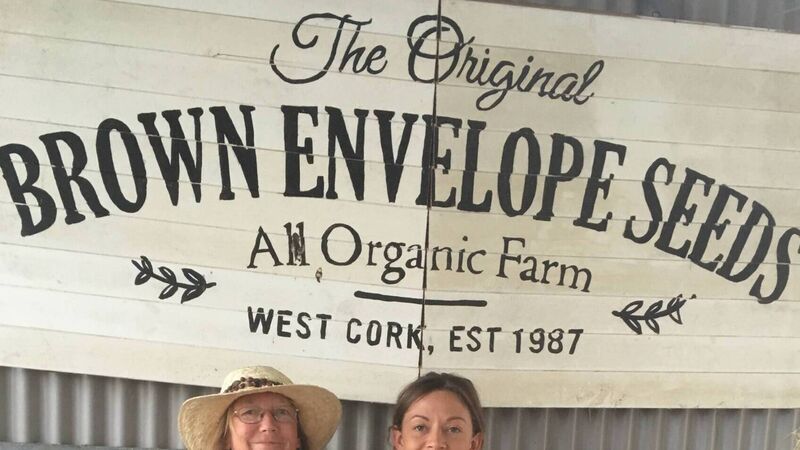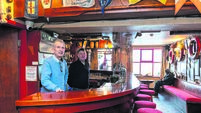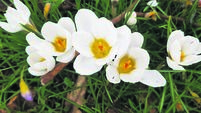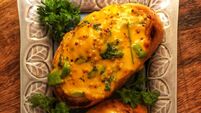Meet Ireland’s only organic seed farmer... based in Cork

Madeline McKeever of Brown Envelope Seeds with her daughter Holly Cairns, TD.
IT’S easy to focus on fresh, seasonal produce pulled from the field, but without seeds there would be no perfect produce.
Brexit and Covid saw a surge in demand for seed. Brexit created scarcity, highlighting how dependent Ireland is on imported seed. Covid triggered a wave of gardening and GIY interest, compounding supply pressures.
Now there is war in Europe, and we are realising for the first time just how reliant Ireland is on imported wheat and barley grain for agriculture, but also for our food and drink industry, putting production at risk.
It poses the question: what is Irish grown in Irish food? By that, I mean: where is the seed coming from?
Madeline McKeever is the founder and owner of Brown Envelope Seeds, one of only two seed farmers in Ireland and the only one exclusively organic. Even as a botanist with two degrees under her belt, at 63, Madeline has only been producing seed commercially for 20 years.
“I had two degrees in botany, but seed saving never occurred to me,” she says.

Based on Turk Head in West Cork, Madeline and her team perform the vital work producing vegetable, herb, cereal, and tomato seeds on just half an acre of land and two polytunnels.
I was expecting something bigger, but as Madeline points out, you don’t need to grow much to collect plenty of seed.
“We grow 20 varieties of tomatoes, but only about six plants of each.”
One tomato can contain hundreds of seeds – it makes sense.
“Plus,” she says, “seeds keep – tomato seeds are good for about ten years if stored correctly.”
Madeline bought the farm at Turk Head in 1987; primarily a dairy farm, she milked her herd of cows until 1999 when she started to grow and sell seed.
“I started selling seed around then and later at Skibbereen Farmers’ Market, mainly peas and beans. There was a growing awareness of food and farming at the time, and I was involved in organising a GM foods conference in 1999, and in 2000 a conference on the globalisation of agriculture.”
The commodification of indigenous foods was starting to influence the food sovereignty of some nations, and a cohort of organic growers in West Cork felt compelled to do something to highlight the issue. But, she says, it took time to build up the business.
“It was a thing I did on the side at the time, alongside managing the farm.
"I took an ECDL course and decided to create a website with the idea of selling seed online. I had to register with the Organic Trust as a seed producer; no-one else was registered at the time. This was 2005.

“I produced a catalogue and had a mailing list. In those days, people would post their order with a cheque inside. Now it’s almost all online.”
Madeline’s first seed catalogue had just 20 varieties. Her 2022 catalogue contains about 150, although she admits that she has more in stock than her catalogue alludes to.
In her office, racks of neatly packaged seeds in her signature brown envelopes speak to the volume and variety of seeds available.
She points at the two large domestic fridges. Inside, loose seeds are stored in airtight containers, labelled, and stacked as tightly as you can imagine. There are sacks of loose beans in a corner into which Madeline plunges her hands, the rushing clattering sound of beans cascading as they run through her fingers. I ask her if she still gets a thrill from putting her hands through the seeds.
“I do. I really do,” she says.

Brown Envelope Seeds is a business, first and foremost, so when it comes to producing seed the first question, she is looking to answer is: does it grow for me and produce seed? But there is also a conservation obligation.
“We are losing old varieties with useful genes but are maybe not practical to grow for commercial producers. When I’m saving those seeds, my motivation is conservation.”
As an exclusively organic seed producer, open pollination is vital to Madeline for many reasons.
“Open pollination means our seeds are not hybrids – usually noted on conventional seed packets as F1. Hybrids are created by taking two genetic lines and in-breeding them until what they produce becomes very uniform. It weakens plants, and if you save seed from F1 hybrids, they generally won’t be as vigorous.

“Nature always wants diversity, and there has to be enough variation to adapt, and we have to think about that and what we are going to need from our seeds in the future.”
For example, Ireland has a very short growing season, and it’s becoming more condensed from the effects of climate change. Plants for successive generations of open pollinated seeds will be more adaptable to changing conditions than a hybridised seed designed for successful growing in a tightly defined set of environmental conditions.
Madeline says her mission at Brown Envelope Seeds is to enable people to grow their own food. Choosing to only sell certified organic seeds is niche and creates its own pressures as a result.
“2020 was our busiest year ever in 20 years of selling seed. Demand surged from commercial growers having difficulty sourcing seed after Brexit, then Covid came, and everyone wanted to have a go at growing their own food during lockdown!
"It really showed up the dependence on imported seed, and then our food security, because of it.”
Madeline’s answer to creating a more resilient seed bank in Ireland, and to expand the availability of open pollinated seed, was to create Seedie.ie.
“It’s like Etsy for seeds,” she explains. People register an account on Seedie.ie and offer up for sale their seeds, fulfil orders, and Madeline takes a small cut from the proceeds.
“People can buy seeds from multiple sellers in one order,” she explains.
“We have someone selling organic flower seeds – the only one in Ireland; someone selling peas and beans, herbs, chillies, leafy greens…”
The reality is that Madeline is looking ahead to retirement after a long farming career. Seedie.ie is her long-term exit strategy.
“Anyone can sell seed on Seedie.ie - it’s a resilient way forward,” she says.
I ask Madeline what role genetically modified (GMO) seeds and gene editing has in the future of seed in Ireland?
“GMOs give seed companies an unnecessary amount of control, and that’s dangerous in the long term. Norman Borlaug [the American agronomist who pioneered GM technology] even only intended GM to be a ten-year solution.
"We’re lucky in Ireland to have a small population and lots of food production. But we import a lot of GM food to feed cattle, only for that meat and dairy to be exported out of the country again. What’s that about?”
Seeds are living things, says Madeline - they breathe; they’re alive. Nature wants diversity, and seeds will find a way.
For more see www.brownenvelopeseeds.comtarget="_blank" rel="noopener noreferrer"> and www.seedie.ie

Does GM and GE have a role in Ireland?
I asked Dr Eoin Lettice, lecturer, and principal investigator at UCC School of BEES, what future role genetic seed technology has for horticulture in Ireland.
“It has to be considered as an alternative, at least as part of the answer. I’m not saying it’s the only tool we use, but it must be one of them. Unless we consider GM and GE, we’re trying to solve problems with one hand tied behind our back.
“Needlessly excluding solutions that could help solve some climate change problems; reduce the impact of agriculture in terms of land use which impacts on biodiversity; in terms of how we tackle pests and diseases with crops, it can help there too.
“I respect growers should have choice in growing what they want. Ultimately, nobody should have the ability to veto tools for other growers either, and if they are safe, it should all be part of it.
“Ruling out technologies like this is a bad move, given where we are with food security. We can go from food secure to food insecure in days, and if the government are asking farmers to grow wheat and cereals this year, I would consider that an element of food insecurity in our food system. GM/GE crops aren’t going to solve big global geopolitical issues, but it gives us more flexibility to solve or react to those problems.”
Why do you think the reaction of many growers is against these technologies?
“It goes back to the early days of GM and the mistrust that built up. Some of it is well placed in terms of how some companies acted and behaved, so it’s not surprising there’s a hangover from when there was a real fear of GM crops. But, ultimately, these technologies are demonstrated to be safe and as good for the environment as any other breeding method.
“Opinions haven’t moved with the technology, and we’re now into GE, which is a much more precise method. GE is next generation; a new, more precise technology that allows us - with pinpoint accuracy - to edit the genome of crops.
“That may sound dramatic, but it’s been happening for 10,000 years in agriculture; breeding crops simply by crossing crops and mixing up their genes isn’t considered a controversial act. Whereas GE is making the very slightest edit at the base pair level of a plant’s DNA - a very controlled and precise edit - yet that is more controversial than taking two plants and mixing up all their genes, which is what nature does anyway.
“So, we have these new technologies. We’re moving away from GM crops, as we understand them, to these GE approaches and solving a lot of misgivings some still have about GM crops.
“New technologies help us solve new problems, problems consumers care about: how to protect the planet, protect our own health, produce crops richer in vitamins and minerals, and produce medicines for us.
“It’s important to have proper conversations between growers, consumers, politicians and activists about how this all gets regulated and how we do agriculture in the future. Agriculture will have to change anyway to deal with climate change and food security issues, and we need to do that with an open mind with all options on the table.
“There’s nothing stopping us from conventional plant breeding, only that it may be too slow. A plant breeding programme might take ten or 20 years, but do we have that amount of time to wait? The climate we’re faced with could be quite different ten years from today. The speed at which GM/GE technology can potentially work is what separates it from conventional breeding, allowing us to adapt more quickly.
“There’s good work ongoing in how we can increase yields based on gene editing to improve photosynthesis and, all things being equal, increase yield, while reducing reliance on fertilisers and overall land use for agriculture, to make us that little bit more food secure as well.
“I can understand people who have firm moral ideas about GE, but we have been changing plants and animals for thousands of years through selective breeding: everything you’re eating has been modified by conventional plant breeding over time.
“This is a different approach, a lab-based approach, but much more specific, accurate and safer in that regard. Ultimately, nothing gets out into the field and shop unless it’s been tested, and GM/GE crops are amongst the most heavily regulated and tested crops and food products out there.
“This all comes down to people being interested in what they are eating, that it’s safe and how their food is produced. I would encourage people to investigate how their food is produced and how food production works, but understand that we have been doing conventional plant breeding for 10,000 years, and GE is the next logical step.”







 App?
App?


